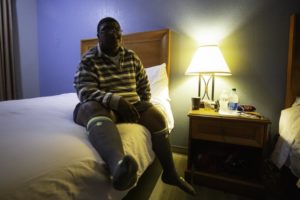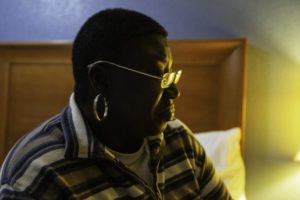These volunteers didn’t wait around to get homeless Austinites into hotels during the historic freeze
Monday, March 1, 2021 by
Andrew Weber, KUT Last Wednesday, Patricia Clark was in a hotel room in North Austin watching “The Fresh Prince of Bel-Air.” She was bored.
Just days earlier, she was outside in the 9-degree weather. The 48-year-old has been homeless on and off for more than half her life, living through cold snaps without heat or water or food or even shelter. She usually just braves the freeze.
This time was different. She and her boyfriend were hunkering down in their tent on the east side, preparing for another deep-freeze when a guy approached her.

Patricia Clark is one of roughly 500 Austinites experiencing homelessness who were given hotel vouchers during the winter storm last month.
He brought food and blankets and tea. Clark assumed he worked with the city. A woman with him was taking folks’ names down for housing in a hotel.
The two were volunteers helping to get as many as 500 homeless Austinites into hotels during the freeze. The effort was organized by Austin Mutual Aid, a group that’s stepped in to fill a crucial gap in relief.
“I was like, oh my God, God does answer prayers,” Clark said, noting that all the stores were closed during the severe weather. “They (were) taking their spare time to cook us something and was bringing us stuff over to the tent. It was a blessing.”
She said the next morning she was picked up and brought to a hotel. Her stay was extended last week.
Bobby Cooper, the founder of Austin Mutual Aid, said that extension likely went on his credit card. He maxed out his card for the first time on Feb. 12, before the storm even hit.
‘Mixing a Disaster’
Cooper has done aid work following hurricanes Sandy and Katrina. He started Austin Mutual Aid at the start of the pandemic to help people staying in encampments, because he saw it as a crisis on top of a crisis. The storm heading toward Central Texas last month was a crisis on top of a crisis on top of a crisis.
He wanted to get hotel vouchers to homeless Austinites as quickly as possible. He said the city wasn’t prepared – that it responded like “cold molasses.” There was confusion about whether there would even be all-day shelters during the extreme cold.
“There was no plan for this. The storm was coming. The city knew about it. The state knew about it,” he said. “And as far as I can tell, we weren’t the only ones contacting the city, getting it out in the public (saying), ‘We need a plan. What’s the plan? Let’s get some emergency shelters going before the storm gets here.'”
The city opened overnight shelters Feb. 12, but it took pressure from more than a dozen nonprofits for the city to leave shelters and warming centers open all day when temperatures stayed below freezing.
So Austin Mutual Aid stepped in and raised money online to help house an estimated 500 people. Cooper said the $300,000 spent on hotels was paid upfront by volunteers.
“That’s absurd,” he said. “Volunteers … don’t have that money. They’ve maxed out their bank accounts. Everyone I know that’s doing this work doesn’t have very much money.”
Bryce Bencivengo with the city’s Homeland Security and Emergency Management office said there was a plan and that the city sheltered close to 1,000 Austinites.

The owners of the Coconut Club downtown are letting Austin Mutual Aid use its space for free.
He admits the community-led efforts were crucial. The city could not have been able to coordinate the level of response put forth by the decentralized collection of groups like Austin Mutual Aid, Austin Disaster Relief Network, Austin Area Urban League and others.
“Mobilizing … a volunteer effort that would’ve been hundreds and hundreds of different restaurants and businesses and services is not something we have ever exercised or even talked about,” he said. “It’s something that we are thankful for the community for; stepping in to fill needs at a time that was harrowing and challenging.” Bencivengo said the city couldn’t let people stay at the hotels it bought to house people experiencing homelessness, because they’re strictly for people who are at-risk or have Covid-19. He said that would be “mixing a disaster” and could jeopardize federal money.
Safety Net
Taylor Cook knows all about doing that work. She used to work for the city on initiatives like a storage program for people experiencing homelessness and providing trash service to encampments.
Last week, she was heading home from the hotel Clark was staying at after an all-day shift volunteering.
Cook said the city’s response is sometimes “overly professionalized” and when something like the crippling freeze comes along, the city can get knocked on its heels.
Cook and the volunteers for dozens of other community-led groups are filling in the gaps. They get stuff done now – not in weeks or months or years. Still, she can’t help but point out the city’s “woefully” inadequate emergency shelter space.

Volunteers Mark Shaw and Alex Morrison unload donations at the Austin Mutual Aid site downtown.
Coming up with a plan to incorporate volunteers to respond to these situations could benefit all Austinites, not just those who are unhoused.
“If we don’t have a robust safety net for people experiencing homelessness, we’re going to be caught not quite knowing what to do when we need to shelter or feed or provide emergency funding for other people who are living on the edge,” Cook said.
‘All We Have Is Each Other’
Cases of bottled water stacked 5 feet high line a wall in the entryway of Austin Mutual Aid’s headquarters. In the next room, there’s an entire food pantry. In another room, volunteers sort clothes beneath a banner that reads “All We Have Is Each Other.”
Austin Mutual Aid has been using the space that used to house the Coconut Club downtown for free. Iffy Roma has been managing operations and ensuring the thousands of requests for food, medical supplies, clothing and water get delivered where they need to go.
She’d been working 14-hour days since the relief effort kicked off and said that while volunteers were run ragged, they were happy to help.
Roma said she wished the city would step in and be a better partner.
“I think that it’s really great of the community that’s shown up, and every day … more people are calling and asking how they can help,” she said. “What I’m not getting any calls from is the city. Instead, my volunteers are getting parking tickets.”
Since the storm, Roma said, Austin Mutual Aid has received roughly one request every six minutes for everything from food and water to diapers or even insulin testing strips. Roughly 100 volunteers are helping deliver those supplies.
Cooper said he wishes this whole response was more of a give-and-take with the city. He said it’s not fair that volunteers who risked their lives driving on ice to deliver meals or broke the bank to get people into hotels should be met with parking tickets. The city reached out to him during the emergency only for supplies, he said, not to offer help.
“I was just asked for 500 meals within the hour for the Millennium Center. I don’t know how that’s going to happen,” he said, shortly after getting the request on Tuesday. “They ran out of food for their relief site.”
‘This Is Real Life’
Officials admitted last week that the city could have been “more responsive,” compared to the community-led groups. Bencivengo said the city wants to correct that going forward, especially if these sorts of weather events become more common as a result of climate change.
“As for how we get better … we’ll have to worry about that in the future,” he said, adding that the city is still responding to hundreds of Austinites without water.

Clark says she hopes the community realizes people experiencing homelessness died during the extreme weather.
City Council voted last week to review its response to the storm and to convene a task force to look into the service gaps.
Clark is not sure her walker will be at her camp and said she may try and stay with a relative. Still, she’s grateful she’s alive. At least one person at the state-sanctioned homeless encampment died during the freeze, and it’s likely others living outside died as well.
Whatever happens going forward, Clark said she hopes people understand that.
“I was blessed and thankful that I was one of the … chosen ones that the people came around where our tent was at and now we ended up here,” she said. “This is real life. This is really some serious stuff that’s happening, (and) people (aren’t) realizing that.”
Austin Mutual Aid is looking to scale up after all this. It will likely move to the Paramount or the Long Center, bringing along its supplies, scores of volunteers and that banner that reminds everyone, “All We Have Is Each Other.”
This story was produced as part of the Austin Monitor’s reporting partnership with KUT.
The Austin Monitor’s work is made possible by donations from the community. Though our reporting covers donors from time to time, we are careful to keep business and editorial efforts separate while maintaining transparency. A complete list of donors is available here, and our code of ethics is explained here.
You're a community leader
And we’re honored you look to us for serious, in-depth news. You know a strong community needs local and dedicated watchdog reporting. We’re here for you and that won’t change. Now will you take the powerful next step and support our nonprofit news organization?










